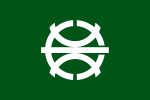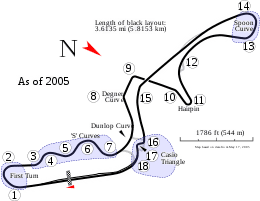Suzuka, Mie
Suzuka (鈴鹿市, Suzuka-shi) is a city located in Mie Prefecture, Japan.
Suzuka 鈴鹿市 | |
|---|---|
 Suzuka City Office | |
 Flag  Seal | |
 Location of Suzuka in Mie Prefecture | |
 Suzuka | |
| Coordinates: 34°52′55.1″N 136°35′3″E | |
| Country | Japan |
| Region | Kansai |
| Prefecture | Mie |
| Government | |
| • Mayor | Noriko Suematsu (since May 2011) |
| Area | |
| • Total | 194.46 km2 (75.08 sq mi) |
| Population (August 2015) | |
| • Total | 196,835 |
| • Density | 1,010/km2 (2,600/sq mi) |
| Time zone | UTC+9 (Japan Standard Time) |
| - Tree | Japanese zelkova |
| - Flower | Satsuki azalea |
| Phone number | 059-382-1100 |
| Address | 1-18-18 Kanbe, Suzuka-shi, Mie-ken 513-8701 |
| Website | www |
As of August 2015, the city had an estimated population of 196,853 and a population density of 1,010 persons per km². The total area was 194.46 square kilometres (75.08 square miles).
Geography
Suzuka is located in northeastern Mie Prefecture, in northern Kii Peninsula, bordered by Ise Bay to the east. Parts of the city are within the borders of the Ise-no-Umi Prefectural Natural Park and the Suzuka Quasi-National Park.
History
Suzuka, as a place name, is mentioned in the Nara period chronicle Nihon Shoki. The ancient Tōkaidō passed through Suzuka, and the Nara-period provincial capital was located within its borders. During the Sengoku period, the area was controlled by Oda Nobutaka, the third son of Oda Nobunaga, who ruled from Kanbe Castle. During the Edo period, much of the area was under the control of the 15,000 koku Kambe Domain, ruled by the Honda clan from 1732 until the Meiji restoration in 1871. During this period, two post stations were located within the modern city limits: Ishiyakushi-juku and Shōno-juku, which prospered due to pilgrimage traffic to the Ise Grand Shrines.
After the start of the Meiji period, the area was organized as part of Suzuka District in 1889. The modern city of Suzuka was founded on December 1, 1942.
Economy
Suzuka boasts a significant industrial market, having major factories for Sharp and Honda in its bounds. These companies outsource part of their labor to South American nationals to secure a contract-based workforce.
Although the Japanese government is encouraging mandatory English-language education across the nation, in Suzuka many courses are offered by private cram schools (juku) and by publicly funded institutions supporting Portuguese and Spanish. In a controversial move, the city's governing body, from April 2004, requires all garbage information and local signage to be in Japanese and Portuguese (but not English).
Education
Colleges and universities
- Suzuka International University
- Suzuka University of Medical Science
- Suzuka Junior College
- Suzuka National College of Technology
Primary and secondary education
- Suzuka has 30 public elementary schools, ten public and one private middle school and five public and one private high school.
- International schools: Escola Alegria de Saber (エスコーラ・アレグリア・デ・サベール) - Brazilian school[1] Formerly Suzuka had another Brazilian school: Escola Sol Nascente.[2]
Transportation
Railway
- Central Japan Railway Company – Kansai Main Line
- Ise Railway – Ise Line
- Suzuka – Tamagaki – Suzuka Circuit Inō – Tokuda – Nakaseko
- Kintetsu Railway – Nagoya Line
- Nagonoura - Mida - Ise-Wakamatsu - Chiyozaki - Shiroko - Tsuzumigaura - Isoyama
- Kintetsu Railway – Suzuka Line
- Ise-Wakamatsu - Yanagi - Suzukashi - Mikkaichi - Hiratachō
Local attractions
Motor racing circuit

Suzuka Circuit was the home of the Japanese Grand Prix from 1987 to 2006, and again from 2009. It is the only figure-eight circuit in the championship, and is very popular with the drivers, in spite of its numerous difficult bends. Located next to the circuit is the Honda Safety Riding/Driving School, where thousands of car and motorcycle drivers have been trained, including many police officers and instructors throughout the world.
Sports
- Honda Heat rugby club
- F.C. Suzuka Rampole football club
Sister city relations


Notable people
- Saitō Ryokuu – Meiji period author
- Nobutsuna Sasaki – author, poet
- Keisuke Tanimoto – professional baseball player
- Takafumi Ogura – professional soccer player
- Eisuke Nakanishi – professional soccer player
- Miwa Asao – beach volleyball player
References
- "Escolas Brasileiras Homologadas no Japão" (Archive). Embassy of Brazil in Tokyo. Retrieved on October 13, 2015.
- "Escolas Brasileiras Homologadas no Japão" (Archive). Embassy of Brazil in Tokyo. February 7, 2008. Retrieved on October 13, 2015.
- "International Exchange". List of Affiliation Partners within Prefectures. Council of Local Authorities for International Relations (CLAIR). Retrieved 21 November 2015.